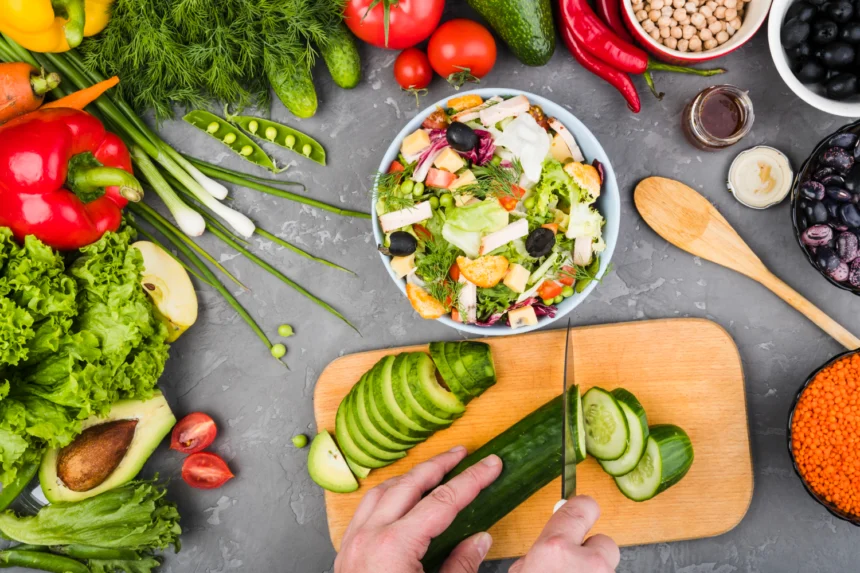Introduction
Are you ready to boost your energy levels and shed those extra pounds? Adopting a plant-based diet might be the perfect solution for you. This guide will walk you through the essentials of following a plant-based diet for weight loss and increased energy, offering practical tips and delicious recipes to get you started.
What is a Plant-Based Diet?
A plant-based diet emphasizes foods derived from plants, including vegetables, fruits, nuts, seeds, oils, whole grains, legumes, and beans. Unlike veganism, which excludes all animal products, a plant-based diet can include occasional consumption of animal products, but the primary focus is on plant foods.
Benefits of a Plant-Based Diet for Weight Loss and Increased Energy
Switching to a plant-based diet has numerous benefits, particularly for weight loss and increased energy:
- Weight Loss: Plant-based diets are typically lower in calories and higher in fiber, promoting satiety and reducing overall calorie intake.
- Increased Energy: High in vitamins, minerals, and antioxidants, plant foods support better energy levels and overall health.
- Reduced Risk of Chronic Diseases: A diet rich in plant foods can lower the risk of heart disease, diabetes, and certain cancers.
- Improved Digestion: The high fiber content in plant-based foods aids in digestion and helps maintain a healthy gut.
For more details on the benefits of a plant-based diet, you can visit Harvard Health.
Understanding Plant-Based Nutrition
Nutrition is crucial when transitioning to a plant-based diet. Ensuring you get the right balance of macronutrients (carbohydrates, proteins, and fats) and micronutrients (vitamins and minerals) is essential for maintaining energy levels and promoting weight loss.
Key Nutrients in a Plant-Based Diet
Certain nutrients require special attention in a plant-based diet:
- Protein: Sources include legumes, tofu, tempeh, nuts, seeds, and whole grains.
- Iron: Found in leafy greens, legumes, nuts, and seeds. Pair with vitamin C-rich foods to enhance absorption.
- Calcium: Available in fortified plant milks, leafy greens, tofu, and almonds.
- Vitamin B12: Essential for energy production, often supplemented as it’s mostly found in animal products.
For an in-depth guide on plant-based nutrition, check out the Academy of Nutrition and Dietetics.
Planning Your Plant-Based Meals
Effective meal planning can make transitioning to a plant-based diet easier and more enjoyable. Focus on variety and balance to ensure you’re getting all necessary nutrients.
Healthy Plant-Based Recipes
Breakfast Recipes
- Overnight Oats: Mix oats with almond milk, chia seeds, and fresh berries.
- Smoothie Bowls: Blend spinach, banana, and almond milk; top with granola and fruit.
- Avocado Toast: Whole grain bread topped with mashed avocado, cherry tomatoes, and a sprinkle of sesame seeds.
Lunch Recipes
- Quinoa Salad: Combine quinoa with chickpeas, cucumbers, tomatoes, and a lemon-tahini dressing.
- Veggie Wraps: Fill whole wheat tortillas with hummus, sliced bell peppers, spinach, and carrots.
- Lentil Soup: Simmer lentils with carrots, celery, and spices for a hearty meal.
Dinner Recipes
- Stir-Fried Tofu: Sauté tofu with broccoli, bell peppers, and a soy-ginger sauce.
- Stuffed Peppers: Bell peppers filled with brown rice, black beans, and corn.
- Vegetable Curry: A mix of sweet potatoes, spinach, and chickpeas in a coconut milk curry sauce.
Snack Ideas
- Fruit and Nut Mix: A blend of dried fruits and raw nuts.
- Carrot and Hummus: Fresh carrot sticks dipped in homemade hummus.
- Energy Balls: Rolled oats, peanut butter, and chia seeds formed into bite-sized balls.
Meal Planning for a Plant-Based Diet
Meal planning involves preparing a weekly menu and grocery list. This approach helps ensure you have all ingredients on hand and can avoid last-minute, less healthy food choices.
Grocery Shopping Tips for a Plant-Based Diet
- Shop the perimeter of the store where fresh produce, grains, and plant-based proteins are found.
- Stock up on pantry essentials like beans, lentils, nuts, seeds, and whole grains.
- Look for seasonal fruits and vegetables to keep meals varied and fresh.
For a comprehensive guide to plant-based shopping, visit Forks Over Knives.
Tips for Transitioning to a Plant-Based Diet
Transitioning to a plant-based diet doesn’t have to happen overnight. Begin by swapping out one meal a day for a plant-based option. Gradually increase this until you’re enjoying plant-based meals throughout the day. This approach helps your body adjust and makes the change more sustainable.
Common Challenges and How to Overcome Them on a Plant-Based Diet
- Cravings for Meat and Dairy: Find plant-based alternatives you enjoy. Experiment with different recipes and products.
- Social Situations: Inform friends and family about your dietary changes. Bring plant-based dishes to gatherings.
- Nutritional Concerns: Plan your meals to ensure nutritional adequacy. Consider consulting a dietitian if needed.
Energy-Boosting Foods in a Plant-Based Diet
Certain plant foods are particularly effective at boosting energy levels:
- Bananas: High in natural sugars and potassium.
- Nuts and Seeds: Rich in healthy fats and proteins.
- Whole Grains: Provide sustained energy due to their fiber content.
High-Energy Plant Foods for Increased Energy
- Quinoa: A complete protein and complex carbohydrate.
- Sweet Potatoes: High in fiber and vitamins A and C.
- Spinach: Packed with iron and other essential nutrients.
Superfoods for Increased Energy in a Plant-Based Diet
- Chia Seeds: High in omega-3 fatty acids and fiber.
- Goji Berries: Rich in antioxidants.
- Maca Root: Known for its energy-boosting properties.
Effective Plant-Based Weight Loss Tips
- Portion Control: Eat mindfully and control portion sizes.
- Stay Hydrated: Drink plenty of water throughout the day.
- Regular Exercise: Combine diet with physical activity for best results.
Exercise and a Plant-Based for Weight Loss and Energy
Incorporating regular exercise into your routine complements a plant-based diet and enhances weight loss and energy levels. Aim for a mix of cardiovascular, strength, and flexibility exercises.
For exercise recommendations, visit the American Council on Exercise.
Tracking Your Progress on a Plant-Based
Keep a journal of your meals, energy levels, and weight loss progress. Regular tracking helps identify what works best for you and keeps you motivated.
Maintaining Motivation on a Plant-Based
Celebrate small victories along your journey. Join support groups or online communities for encouragement and recipe ideas.
Vegan vs. Plant-Based for Weight Loss
While both diets can promote weight loss, a plant-based diet might be more flexible, allowing occasional animal products. Choose the approach that best fits your lifestyle and preferences.
Sustainable Weight Loss with a Plant-Based
Focus on long-term habits rather than quick fixes. A sustainable approach ensures lasting weight loss and energy improvements.
Addressing Nutritional Deficiencies in a Plant-Based Diet
Ensure you’re getting enough of the key nutrients by planning balanced meals and considering supplements if necessary.
Supplementation in a Plant-Based Diet
Common supplements include vitamin B12, vitamin D, omega-3 fatty acids, and iron. Consult a healthcare provider before starting any supplements.
For more information on plant-based supplements, visit NutritionFacts.org.
Success Stories on Plant-Based Diet for Weight Loss and Energy
Reading about others’ successes can be motivating. Look for testimonials and case studies of people who have achieved their weight loss and energy goals with a plant-based diet.
Conclusion
Embracing a plant-based diet is a journey towards better health and vitality. Remember, the key is to enjoy the process and celebrate small victories along the way. With these tips and a little planning, you’ll be on your way to a healthier, more energized you.
FAQs
How quickly can I lose weight on a plant-based?
Weight loss varies per individual, but many people start seeing results within a few weeks of following a plant-based diet.
Do I need supplements on a plant-based?
While a well-planned plant-based diet can provide most nutrients, some people might need supplements like vitamin B12 or vitamin D.
Can I build muscle on a plant-based?
Yes, many plant-based foods are rich in protein and can support muscle growth. Include a variety of protein sources and ensure you meet your calorie needs.
What if I crave meat and dairy?
Explore plant-based alternatives and find new favorite recipes. Over time, your taste preferences may change.
Is a plant-based expensive?
A plant-based diet can be affordable, especially when focusing on whole foods like grains, legumes, and seasonal produce.
Can children follow a plant-based?
Yes, but it’s essential to ensure they receive all necessary nutrients for growth and development. Consulting a dietitian is recommended.


